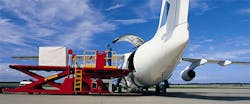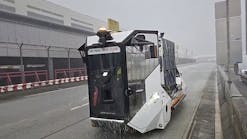ICAO, TIACA Accelerate Collaborative Efforts for More Efficient Air Cargo Facilitation
The International Civil Aviation Organization (ICAO) and the International Air Cargo Association (TIACA) have taken steps to intensify their cooperation to optimize the efficiency and security of international air cargo, a sector that is forecast to grow at an annual rate of 4.2 per cent through to 2032.
Their new agreement is outlined in a communiqué resulting from the 28th International Air Cargo Forum & Exhibition (ACF 2016) that was convened in Paris by TIACA and which took place from Oct. 26-28, 2016. It builds on a variety of previous agreements that ICAO has undertaken with international bodies on the challenges faced by the air cargo network as it expands.
"The importance of air cargo to the global economy is clearly established, in particular its role in facilitating the delivery of high-value goods, just-in-time freight operations, and growing e-commerce activities," declared ICAO's Secretary General, Dr. Fang Liu. "Our shared objective with TIACA is to improve regulatory and procedural efficiencies and expedite cargo movements for all global citizens and businesses."
ICAO and TIACA have identified a number of important initiatives to streamline the ongoing replacement of paper documentation with electronic communication for air cargo shipments. One example of this is the deployment of electronic Consignment Security Declarations and Air Waybills. The two organizations will also be working together to develop a technology platform for the support of Pre-Loading Advance Cargo Information (PLACI) systems.
The two organizations have also recognized the critical need to develop advanced screening technologies, and agreed to promote dialogue between regulators, the air cargo industry and equipment manufacturers to identify new requirements and solutions.
In her remarks to the air cargo experts assembled at ACF 2016, Dr. Liu stressed the importance of ensuring proper implementation of the modernized regulatory framework that has resulted from ICAO's cooperation with air cargo industry organizations over the past several years. She highlighted the implementation of ICAO and TIACA's Cargo Service Quality Index for measuring cargo performance at the airport level, the need to stay aligned on emerging challenges such as lithium-ion battery shipments, big-data and e-commerce, and TIACA's offer to assist ICAO with cargo industry training and certification.
"ICAO is pursuing a number of key priorities to aid air cargo security and facilitation, ensuring growth while maintaining high levels of safety and security, building capacity to ensure effective implementation of ICAO's standards and policies and promoting e-freight to encourage full exploitation of modern technologies," she told delegates. "The recently concluded ICAO 39th Assemblyhas made these goals clear, and I am confident that by working together we will make great inroads towards achieving them by 2020."





